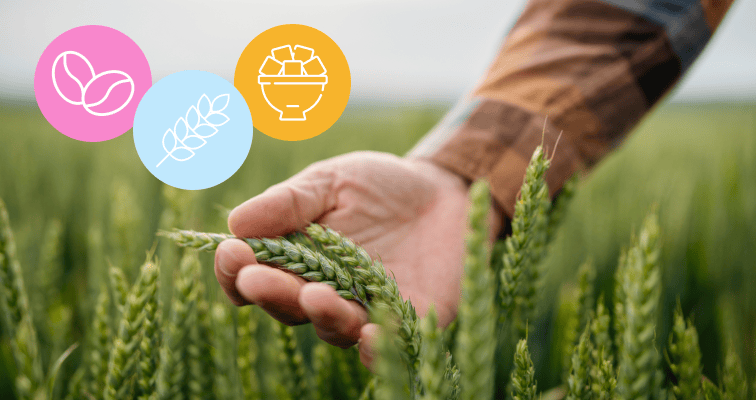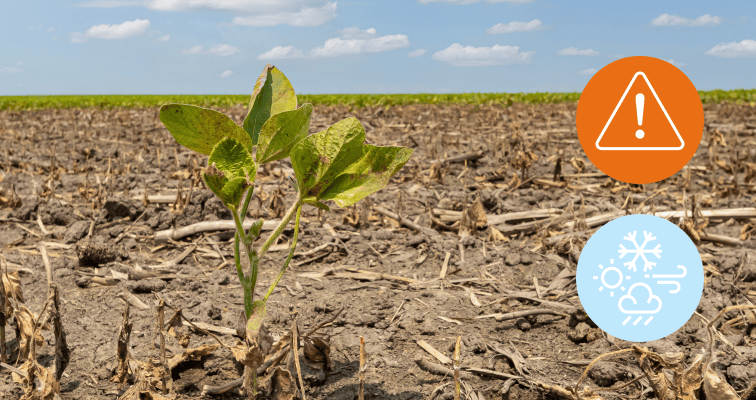Agricultural commodities trading and investing can offer an opportunity to enhance portfolio diversity and potentially generate returns. Learn what agricultural commodities are, how to invest in them and what might impact the price of an agri commodity.
Agricultural commodities, often referred to as “agri” or “soft” commodities, play a unique role in the global economy. They are necessary goods with extremely inelastic demand. Agri commodities are not dissimilar fromto other financial instruments in that they can be bought and sold with the aim of making a financial return.

What are agri commodities?
Agricultural commodities include the unprocessed products of farms, ranches, nurseries and forests that have been cultivated or raised, and later sold in the open market. They constitute a distinct category within the broader commodities sector, and can have a significant influence on daily economic transactions.
In addition, governments and agencies often intervene in these markets to ensure “food security,”, which highlights their vital role in ensuring a stable food supply.
Tip: Agricultural commodities are increasingly being used to produce green energy biofuels.
Most traded agricultural commodities
Coffee is the most extensively traded agricultural commodity in terms of both value and trading volume, and the global coffee trade is worth around $30bn annually.
Soybeans and cocoa are the second and third most actively traded agricultural commodities, respectively. Other major markets include:
How to invest in agricultural commodities
Agri futures & CFDs
Futures trading on commodity exchanges, such as the Chicago Mercantile Exchange, determines the global pricing of agricultural commodities. Despite being available on exchanges, the technical nature of futures, alongside the considerable capital required to trade them, can make them unsuitable for beginner investors.
Instead, many investors prefer to trade agri CFDs, which mirror the price movements of the underlying futures traded on the exchange, while allowing smaller trades to be opened.
Agri ETFs
Exchange-traded funds (ETFs) are passive investment vehicles that track the price of a group of assets. For example, the Invesco DB Agriculture Fund ETF is made up of a selection of the most liquid and widely traded agricultural commodity futures. The returns are intended to reflect the overall economic conditions in the agricultural sector. By investing in this ETF, investors gain diversified exposure to the agricultural commodities sector in a single trade.
Agri stocks & shares
Stocks are a popular option among investors because of their convenience and cost-efficiency as a financial instrument. Buying shares in firms that extract or process agricultural commodities is an indirect way of gaining exposure to the agricultural commodities market.
The correlation between the stock price and the price of the underlying commodity will vary across instruments and over time. However, stocks have other functionality features, such as dividends, which can make them a good entry-level option for investors looking to invest in agri commodities.

What affects agricultural commodity prices?
Agricultural commodity prices are heavily influenced by macroeconomic cycles, which exert significant influence on global demand. These shifts in the underlying economy often trigger long-term price movements across the entire commodity sector, making them a popular target for trend investors.
Moreover, price moves in agri commodities can be dramatic and unpredictable, particularly in instances where the equilibrium between supply and demand is disrupted by weather events and natural disasters. These volatile scenarios often attract the interest of day traders who speculate on short-term price moves.
Tip: Political decision-makers can cause movements in commodity prices by easing or tightening international trading arrangements.
Risks of trading agricultural commodities
Every investment involves an element of risk, but it is important to note that agricultural commodity markets are at the higher end of the risk-return spectrum. These markets have relatively high price volatility, and many of the price drivers, such as weather events, are unpredictable.
Investors whothat do not adopt a well-thought-out strategy run the risk of emotional trading when markets are distressed, potentially leading to the untimely closure of positions that might have eventually resulted in returns.
Tip: Commodities, including agricultural commodities, are often bought as a hedge against inflation.
Advantages of trading agricultural commodities
Investors are typically drawn to the agricultural sector because of the potential to make returns, but diversifying your portfolio by investing in agricultural commodities has the chance to offer a range of additional advantages.
Price fluctuations within this sector can exhibit an inverse correlation with those in alternative markets, such as the stock market. In addition, a portfolio with a wider range of asset types can generally be expected to generate smoother returns, as gains and losses across different positions will hopefully balance each other out in the long run.

Final thoughts
There are plenty of reasons to invest in agricultural commodities, and the benefits of broadening your investment approach should not be underestimated. Understanding how the markets and their price drivers work can help you to make more intelligent investments, and hopefully get you one step closer towards achieving financial independence.
Visit the eToro Academy to learn more about investing in commodities.
Quiz
FAQs
- How do investors manage the risks posed by extreme weather conditions?
-
A weather derivative is a financial instrument that can be traded on an exchange. These derivatives take the form of options and futures, and are used by companies or individuals to hedge against the risk of weather-related losses.
- What is food security and how is it managed?
-
Food security explains the actions of governments and agencies, such as the US Department of Agriculture, to ensure the uninterrupted availability of agricultural resources at affordable prices. These agencies keep track of storage capabilities and market dynamics, and manage the procurement and distribution of stockpiled reserves, all while fostering international trade relationships.
- Are agricultural commodities a good investment?
-
No investors can be certain about how market prices will evolve in the future. However, for those whothat find themselves heavily invested in alternative asset classes, investing in agricultural commodities can help to increase the level of diversification in a portfolio.
This information is for educational purposes only and should not be taken as investment advice, personal recommendation, or an offer of, or solicitation to, buy or sell any financial instruments.
This material has been prepared without regard to any particular investment objectives or financial situation and has not been prepared in accordance with the legal and regulatory requirements to promote independent research. Not all of the financial instruments and services referred to are offered by eToro and any references to past performance of a financial instrument, index, or a packaged investment product are not, and should not be taken as, a reliable indicator of future results.
eToro makes no representation and assumes no liability as to the accuracy or completeness of the content of this guide. Make sure you understand the risks involved in trading before committing any capital. Never risk more than you are prepared to lose.


